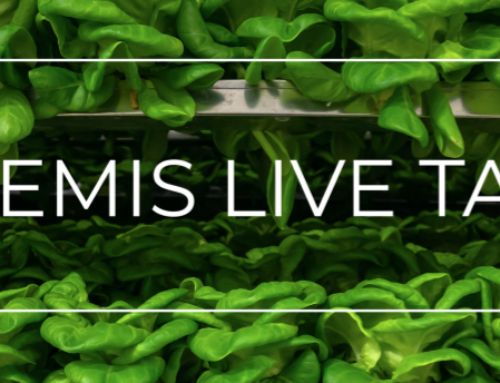Every Thursday at 4pm ET, Artemis hosts an episode of Artemis Live Talks, where we interview folks from the agriculture industry. Rindi Bristol, Senior Director at Whole Leaf, joined us for Episode 25. Check out the full interview here.
 Rindi has over 25 years’ experience in sales, including 15 years in the foodservice industry with Sysco and The Star Group. After joining The Star Group in 2013, Rindi was appointed Senior Director of Whole Leaf, The Star Group’s greenhouse whose Wendy’s Sandwich Leaves & Salad Blend won the Innovative New Product Award for the 2021 CEA Awards, presented by Artemis. Inspired Greens is Whole Leaf’s brand of whole-head lettuce, sold at major retailers in Canada, and Inspired Leaves is their brand for value-added products such as packs of mixed salad greens.
Rindi has over 25 years’ experience in sales, including 15 years in the foodservice industry with Sysco and The Star Group. After joining The Star Group in 2013, Rindi was appointed Senior Director of Whole Leaf, The Star Group’s greenhouse whose Wendy’s Sandwich Leaves & Salad Blend won the Innovative New Product Award for the 2021 CEA Awards, presented by Artemis. Inspired Greens is Whole Leaf’s brand of whole-head lettuce, sold at major retailers in Canada, and Inspired Leaves is their brand for value-added products such as packs of mixed salad greens.
Educating the End Consumer
Rindi is passionate about changing consumer’s relationship with produce. “When you walk into the produce department… you don’t see great branding… I can’t tell you what brand of bananas I have on my counter right now.” She recognizes that teaching consumers about the variety of produce greenhouses can provide is a win-win opportunity. “We have social channels through which we engage with our end users… we have given out lettuce at hockey games, football games, and to people on their commutes home because we needed that brand exposure. We knew that as soon as people had it in their hands and took it home and they tried it, it would be an experience unlike anything they had had before. We knew they would really love it.”
Introducing New Flavors to North America
There is a world of produce varieties that the average consumer in North America hasn’t historically has access to or even known about. This is what Rindi is working to change. “It’s about introducing these new taste innovations… we want to come up with ways of introducing the consumer to new tastes, new flavors, new leaves, new textures, but in a way that’s familiar to them and at a price where they’re willing to take a chance and experiment. I think that during the pandemic people are getting into their kitchens and they’re working with food and starting to learn.”
Rindi draws inspiration from the history of greenhouse produce in Europe and draws lessons from European produce consumers. “In North America, we are very into sweet and
crunchy [greens]. We’ve loved our Romaine and our Iceberg for a long time. But all of the seed companies supplying hydroponic lettuce are in Europe… and they’re [supplying] a completely different consumer. They like Lolo’s they like Batavia’s and stuff that we have never eaten here because we’re a little bit behind. We had to figure out a way to introduce those to consumers and do it gently in a way that was familiar to them, so they are willing to experiment and continue to come back.
Educating the Retailer
Changing the North American consumer’s relationship with produce goes hand in hand with changing how the retailer’s stock and display produce. Step one was getting the products into stores. “We really had to market differently. In the very beginning no retailer was going to give up four feet of their store to an untested product… [Five-deck spaces] are contracted out every three years, so trying to break into a five-deck space to get our value-added products on the shelf [happened] through a lot of discussion. We just were extremely grateful that our retail partners had long, established relationships and they were willing to give us a chance.”
Step two was working with the retailers to change where and how the product was displayed. “We came up with our own way to carve out space on the store’s floor. One of the things that’s unique about Inspired Greens is that we’re able to be
merchandised at ambient [room temperature], so we don’t need refrigeration. We’ve gone out and said ‘if we can’t have a four or eight-foot space on your wet wall, give me a four-foot space on your floor.”
Sustainable Packaging
Growing produce that can be stored at room temperature allows for innovative, sustainable packaging. “Our whole head lettuce just moved to a different type of plastic…. We know that customers have a hard time putting their clamshells of their sleeves in the garbage… so we’re really on a quest to find packaging that is backyard compostable which is completely different than other compostable. We want to be able to take that sleeve when we’re done with it and put it in the sink and run some water over it and have it dissolve.”
Produce in Food Service
Rindi has a background in food service, so she is quite proud of Star Produce, part of The Star Group, becoming the exclusive supplier of greenhouse grown lettuce to nearly 400 Wendy’s restaurants across Canada. Rindi shared some key insight into the food service industry’s approach to produce. “Lesson number one is food service cannot be without. Consumers just don’t have a tolerance for being out. You can’t go to a Wendy’s and not be able to get a salad.”
Rindi explains that tomatoes were the first greenhouse produce product to be widely adopted by the food service industry over the last ten years. “Probably the number one reason was consistency. There was just consistency in the product quality and flavor that greenhouses produce can give you that most consumers haven’t experienced yet. Once [food services operators] saw the success of a hydroponic tomato it was like, ‘what’s next?’ Because of some of the challenges out in the field, lettuce seemed like the next step.” But finding greenhouse lettuce suppliers that can meet the high volume needs of the food service industry can be difficult. “You had to find someone that can meet the needs of 400 stores from British Columbia to Prince Edward Island.”
Once Star Produce proved they could deliver, they had to work with Wendy’s to change how they think of yield. With field lettuce, they measured the weight of a head of lettuce, but much of that weight is its inedible core. Instead, “we looked at how many burgers you can get out of a case.” They also looked at “how much labour we could save them in the back of the house getting ready in the morning because they weren’t chopping or dealing with the core.”
Finally, they looked at cost savings. “At the end of the day, a value-added product doesn’t call in sick, so that is where we can come to the table… We’re local and we’re year-round. The Canadian Food Inspection Agency is now implementing mandatory testing of all field lettuce entering Canada starting in the Fall. That’s extra work, it’s more money, and it’s more labour that’s being put on our retail and our food service partners. So we’re able to sidestep that and deliver the next day. We’re close to home and we can get there, you don’t have to worry about trucks being stopped at the border. For Canadian customers, that’s a win.”
Thank you for joining us, Rindi!



Leave A Comment